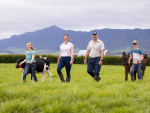The Government is looking into farmer claims that regional councils aren’t ready to implement new intensive winter grazing regulations.
Federated Farmers, DairyNZ and Beef + Lamb NZ (B+LNZ) want the introduction of new regulations delayed by a year to November 2023.
They accuse the Government of failing to get its freshwater farm plans (FWFP) in place in time, meaning thousands of farmers will have to go down the expensive consenting process for winter grazing on farms.
The sheer number of consents needed means some regional councils won’t be able to process resource consents in time, especially as farmers need to plan for next season’s forage crops now.
Environment Minister David Parker told Rural News that, in a recent letter to him, several industry bodies raised concerns about the readiness of councils.
“I’ve therefore directed officials to work with relevant councils to get a full picture of councils’ readiness to implement the intensive winter grazing regulations,” says Parker.
“I expect to receive advice on this shortly.”
The current rules, developed as part of National Environmental Standards for Freshwater 2020, require farmers who graze livestock on an annual forage crop over winter, and do not meet a range of permitted activity criteria, to either gain a certified FWFP or to apply for a resource consent from 1 November 2022.
Federated Farmers Southland winter grazing spokesperson Jason Herrick told Rural News that the Government keeps getting the process wrong.
He says FWFPs should have been rolled out well in advance of the rules around winter grazing.
“Now thousands of farmers will now have to apply for a resource consent for winter crops for next season, and the problem being farmers are making those decisions right now and the regional councils do not have the resources to process the amount possibly needed therefore delaying precious time,” Herrick says.
“I think the last three years have been proof enough that education over regulation has produced positive results on winter grazing.
“So, therefore we ask, are regulations actually necessary?”
B+LNZ chief executive Sam McIvor believes a delay in the implementation of the rules won’t be at the expense of the environment.
While Parker hasn’t rejected the call for an extension yet, he points out that the Government has been working with councils, iwi and farming groups since early 2021 to make improvements to the intensive winter grazing regulations as they are implemented.
“We also deferred the commencement date of these regulations to enable farmers and councils time to prepare ahead for the 2023 winter-grazing season.”
Parker claims that under the new regulations, farmers are permitted to undertake intensive winter grazing if it complies with the default conditions set out in the regulations.
“A resource consent will be required only if these conditions cannot be met.”
He adds that the Government is working on certified FWFPs to allow farmers an alternative way to meet the conditions.











